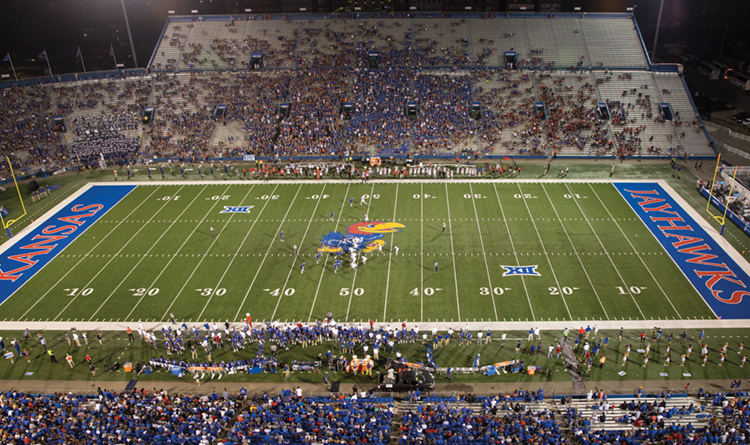From athletic events to finances to visitors to legacy, KU Athletics and the city of Lawrence come together to create an unmatched vision of enduring success.
| 2017 Q3 | story by Bob Luder, photos by Steven Hertzog
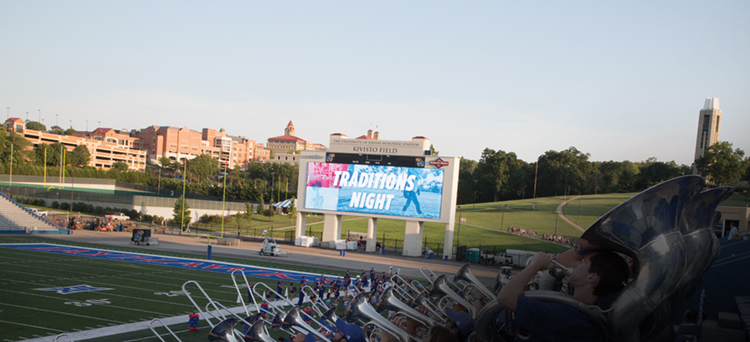
The KU Band performs on Tradition Night in Memorial Stadium.
With a budget that measures short of nine figures, The University of Kansas (KU) Athletics department will never be confused in size with some of the state’s behemoth corporations like Cerner or Cessna. No one who follows KU athletics, whether from the outside looking in or helping operate from the inside, can fail to recognize its impact reaches far beyond dollars and cents.
While those aforementioned giants of industry certainly leave their own distinctive and lasting marks, it can be argued that high-profile college athletics—notably the two main revenue producers, football and men’s basketball—have as great an impact in terms of regional and national visibility, publicity and community self-esteem, as any megacorporation.
The numbers might not pop like the billions of dollars earned annually by Cerner’s medical information technology or Cessna’s aerospace engineering, but make no mistake: KU athletics are big business.
“A lot of people don’t want to recognize that we’re a corporation,” says KU athletics director Sheahon Zenger. “But we have one of the top 25 to 30 (college athletic) budgets in the country. We have the third-largest budget in the Big 12 Conference (trailing only Texas and Oklahoma).”
In fact, the Jayhawks men’s basketball team recently brought attention to the U.S., Kansas, Lawrence and the University with a series of victories in exhibition games in Italy. Year in and year out, a majority of games played by the Jayhawks hoopsters are nationally televised, either on ESPN or CBS. ESPN’s flagship college program College GameDay usually broadcasts at least once per season from Allen Field House. It seems the Jayhawks are always a high seed in the NCAA Tournament and a threat to make the Final Four.
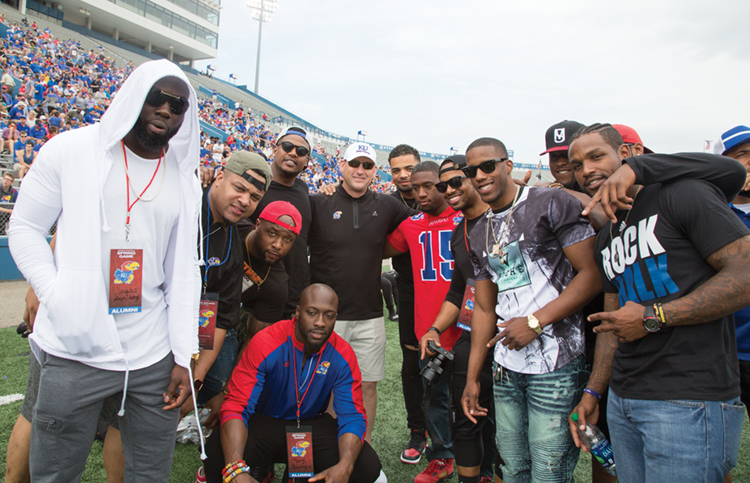
Former football players from years past return to Lawrence to support head Coach David Beaty at the spring football game.
The football team, while struggling to win games in recent seasons, benefits from being part of the Big 12 Conference’s TV football package. All of its games are televised, at least regionally. And, the Jayhawks still pack tens of thousands into Memorial Stadium on home game days, contributing to filling local hotels, restaurants and other downtown and campus establishments.
Then, there is the intangible impact of the legacy of KU sports. The history of the sport of basketball practically emanates from here, what with the game’s inventor being KU’s first basketball coach. The original rules of the game are housed in a building adjacent to Allen Field House, which happens to be named after Phog Allen, widely recognized as the “Father of Basketball Coaching.” One of the greatest players in history, college or pro: Wilt Chamberlain played here.
The football program also has a list of luminaries—Gale Sayers, John Riggins, Pepper Rodgers, John Hadl—who have left lasting legacies. In non-revenue sports such as track and field, Jayhawk alumni have set world records or placed highly in national and international competition. Jim Ryun held the world record in the mile run for many years in the 1960s and ’70s. Al Oerter unprecedentedly won gold medals in the discus at four consecutive Olympic Games.
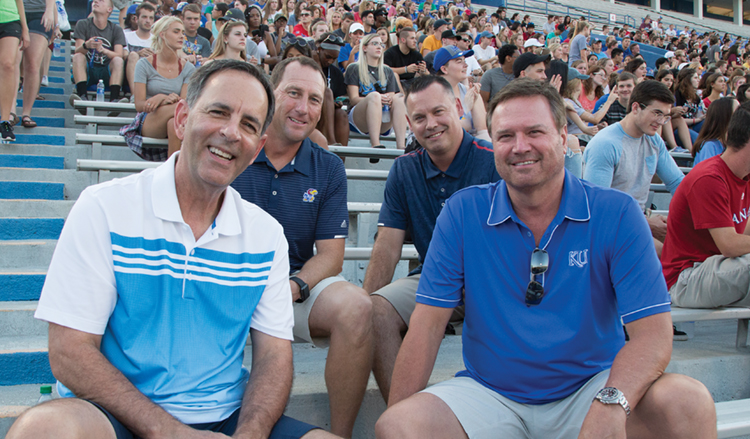
Coaches Ray Bechard, David Beaty, Brandon Schneider and Bill Self share time together before speaking to the new students on Traditions Night.
Much more recently, Mason Finley, a former Jayhawk discus thrower, earned a bronze medal at the IAAF World Track and Field Championships, in London.
It’s not difficult to understand why a large chunk of Lawrence’s and KU’s civic pride emanates from the lasting success of the University’s athletics programs.
“It’s safe to say that the majority of people here know that KU sports are an important part of our city’s identity,” says Porter Arneill, interim communications manager at the Lawrence City Manager’s Office. “It brings our community national attention and benevolently impacts the local economy.”
By the Numbers
The annual budget for KU Athletics hovers around $90 million, explains Pat Kaufman, the department’s chief financial officer. Of that total, the University contributes $1.5 million. Students kick in about $300,000 from activities fees, which helps pay for student labor.
“All other revenue comes from nongovernment sources,” Kaufman says.
Those sources include ticket sales, corporate sponsorships, media contracts and private donations. Kaufman says the department typically kicks back $2 to 2.5 million annually to the state of Kansas in sales taxes.
“We feel we give back to the state more than we take,” he says.
Kaufman went on to say that the Athletics department annually writes tuition checks totaling around $7.5 million. Add in housing costs and meals—room and board, in more general terms—and about $14 million of the annual budget goes directly to student-athletes’ scholarship costs.
Revenue from trademark licenses, which generally is around $2 million, is split 50-50 with the university.
In all, KU sponsors 18 sports—11 women’s, 7 men’s. About 500 student-athletes compete during a given school year (the football team alone lists more than 100 players on the roster). A sizeable majority of those student-athletes enjoy the benefits of some form of scholarship.
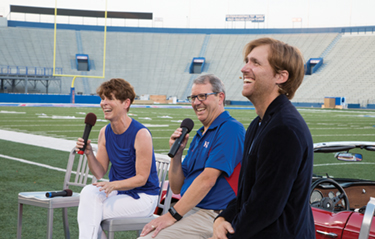
Chancellor Douglas A. Girod and his wife Susan having fun at Traditions Night with MC Dr. Mike Anderson.
The department enlists 230 full-time employees and another 250 who are part-time. In addition to coaching staff—football lists 30 assistant coaches and support staff, while men’s basketball has eight—and administrators, there are spirit squad coaches, academic support counselors, compliance and student services personnel, communications and marketing and, of course, athletic trainers and sports medicine.
And, that’s not counting all the various game-day event staff, concession vendors and the like, many of whom are contracted out through an outside company, Centerplate.
“At most universities, football and men’s basketball subsidize the remaining sports,” Kaufman says. “Typically, the football team leads the way. With football, you have TV revenues. That generates more than just ticket revenues.”
Kaufman says the annual budgeting process for KU Athletics is pretty typical of other NCAA Division I universities. Administrators gather and determine what the year’s revenue sources are going to be. They do the same with expenses. They project what all the various teams are going to need for upcoming seasons. Zenger sets priorities, then everyone goes about meeting their respective goals.
“Overall, our budget is break-even typically; we operate within our means,” Kaufman says. “We have the ability to adjust when we need to.”
The Impact of a Home Football Game
Michael Davidson, executive director of eXplore Lawrence, shared an economic impact report compiled by the organization that measured the dollars-and-cents impact of a KU home football game. The study was based on 25,000 attendees, with 40 percent of those being out-of-towners staying overnight. Dollar totals only take into account visitors’ expenditures and don’t account for game-day spending by locals.
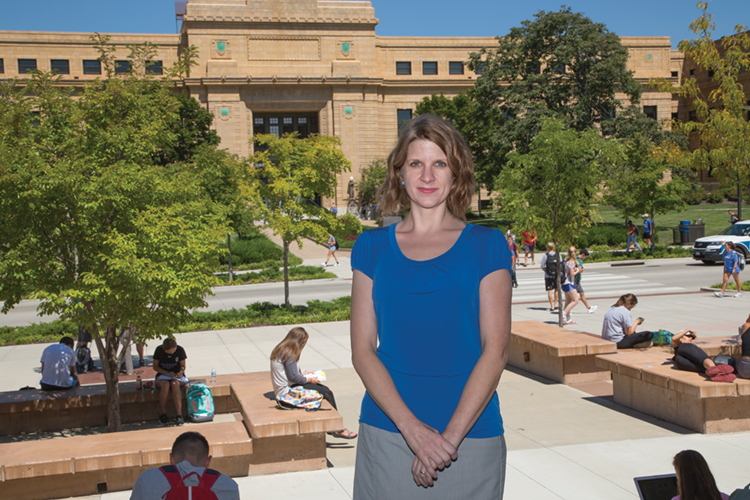
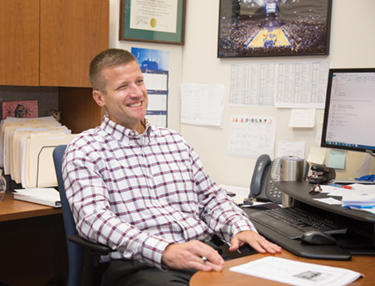 Erinn Barcomb-Peterson-Director of News and Media KU Athletics; Pat Kaufman CFO KU Athletic department
Erinn Barcomb-Peterson-Director of News and Media KU Athletics; Pat Kaufman CFO KU Athletic department
Key findings in the study showed that such a home game resulted in direct business sales in the city of $2.8 million, including nearly $1 million alone in revenue from hotel stays (estimated room demand, 6,275) and total business sales just greater than $4 million.
Local jobs directly supported were 2,888, with total supported jobs at 3,188. Income direct to the city in the form of local taxes were estimated at $145,271, with net direct tax return on investment of $133,756. Total visitor days spent in Lawrence: 21,335.
Simply put, big-time college athletics is a big deal to the cities that host them. And, that doesn’t just include football and men’s basketball. Rock Chalk Park, KU’s still-new complex, which includes world-class track and field facilities, softball and soccer stadiums, a tennis complex and a city-owned and operated recreation center, hosted the USA Track and Field National Junior Olympic Track and Field meet in late July.
“According to the city’s 2016 economic development report, last year, more than 52,000 people attended 47 KU sporting events held at Rock Chalk Park,” Arneill says. “These events often generate hotel stays, dining and retail activity that benefit the community and remind visitors of Lawrence’s unmistakable character.”
Not only do KU athletics bring treasure to the city’s coffers, they bring exposure to the university itself. Most times an event is shown on TV, there is a segment about the University’s academic reputation and images broadcast of campus and Mount Oread.
“KU’s athletic programs are indeed an asset to the University in terms of not only what they provide in scholarships and experiences for student-athletes, but also in the visibility they give KU on a national scale,” explains Erinn Barcomb-Peterson, director for news and media relations for the University. “When the university is named or the Jayhawk logo is shown to national audiences because of sports, that’s exposure to prospective students, alumni and donors, and otherwise would cost millions of dollars in paid advertising.
“KU can stand alone on its academics and research, and those are accomplishments we tout consistently, including in national campaigns like the recently unveiled ‘Our Chant Rises,’” she continues. “Yet, our active Athletics program is often the gateway to reaching those audiences of prospective students, alumni and donors.”
Much More Than Money
Then, there are those the Athletics program impacts most, the student-athletes themselves.
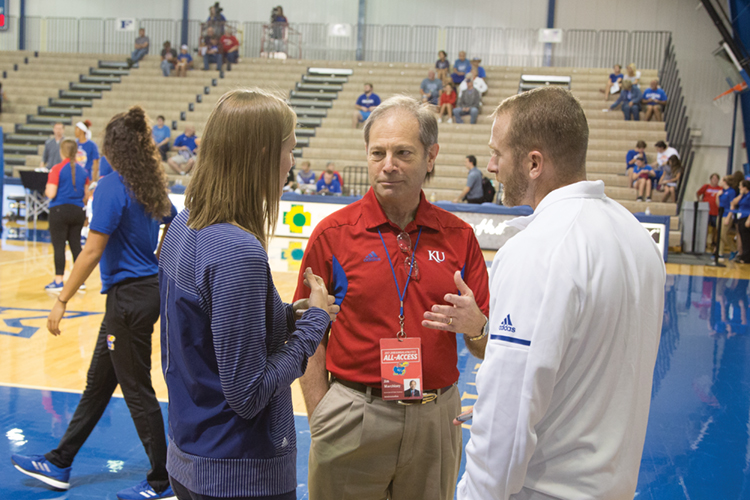
Associate Athletic director Jim Marchiony speaking with KU staff before the start of the Women’s volleyball opener.
The NCAA prohibits college student-athletes from being paid directly, so they must reap benefits in other ways. High-profile football and basketball players have the opportunity to develop their games in the hopes of one day making big money in professional sports. KU’s latest high-profile athlete to do this was Jayhawk guard Josh Jackson, who was an NBA lottery pick with the Phoenix Suns after one season of college ball, and teammate Frank Mason III, who rode his consensus college player-of-the-year performance his senior season to a second-round draft pick with the NBA’s Sacramento Kings.
Of course, opportunities for college athletes like Jackson and Mason to cash in on their talents are few and far between. But there are other benefits for student-athletes to enjoy.
It’s those perks that stoke the fires in Zenger and make him most proud of being KU’s athletics director.
“It’s always about building the whole person,” he says. “I had a recent conversation with Hank Booth (longtime Lawrence radio personality and one-time public address announcer at KU football and basketball games), and we discussed how, in recent years, more student-athletes are becoming more about the academic side. We just set an all-time (grade-point average) record between 3.1 and 3.2 for 500 student-athletes.
“Student-athletes as a whole are goal-oriented young people,” he continues. “And, we have some great young people in this program.”
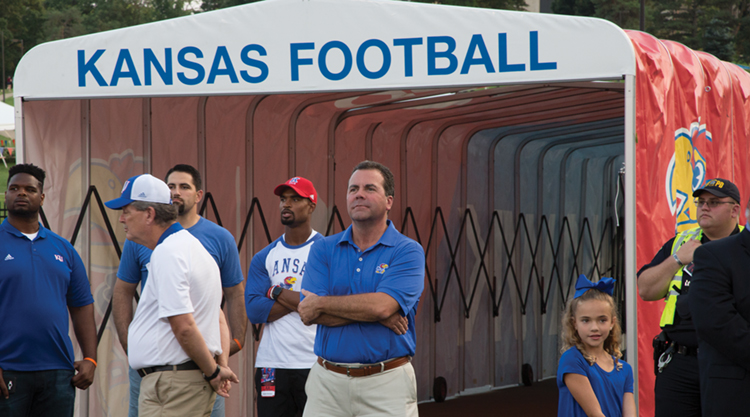
KU Athletic Director Dr. Sheahon Zenger
One program Zenger takes particular pride in is KU Leads, a student-athlete development program focused on leadership training, community engagement, traditions and professional development. He says during the last few years, student-athletes have raised upwards of $3 million in the Lawrence community. And, even when they’re not directly involved in community service, KU student-athletes are omnipresent, attending local high school games or even walking the aisles of local supermarkets.
“I think there’s a symbiotic tie between (KU athletics and Lawrence),” he says. “When one does well, the other does well. There’s just an energy in the community felt between the student-athletes in this community. It’s a special relationship.”
While Zenger obviously takes great pride in Mason being named consensus men’s basketball national player of the year or Dorance Armstrong Jr. being named the Big 12’s preseason defensive player of the year, he equally likes to point to current or former KU student-athletes such as Cassie Wait, a former Jayhawks volleyball star who recently completed her first year of law school. Or, Rhavean King, who ran track and now is a commissioned officer in the U.S. Marine Corps.
“These people are why it is we do what we do,” Zenger says. “They’re shining examples of what makes the University of Kansas one of the great academic institutions in the country.”
Zenger says he remembers a college president at Illinois State once referring to athletics as the “front porch” of a university, the part of a university that oftentimes gives it the greatest exposure to the outside. He said he invites his university, The University of Kansas, to “put its furniture on the front porch.” It’s a massive responsibility he, and the department as a whole, takes to heart and is eager to uphold.
“I think it’s why we’re put on this earth,” he says. “To educate young people to be contributors to their community, the country and the world.”
